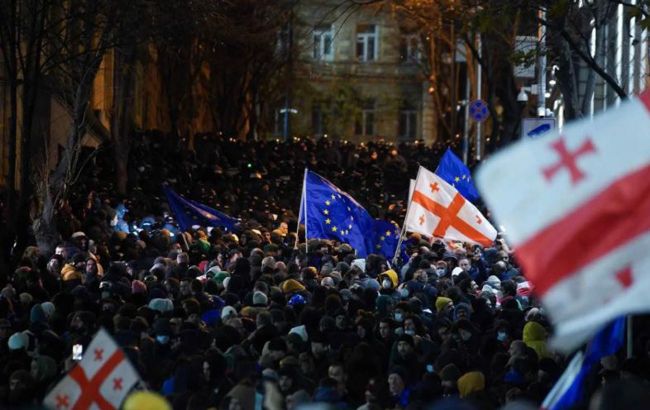Georgia's special forces dispersing protest in Tbilisi again
 Photo: Police officers violently detain people in the center of the Georgian capital (twitter.com/natowetrust)
Photo: Police officers violently detain people in the center of the Georgian capital (twitter.com/natowetrust)
Thousands of people took to the streets of Tbilisi on December 6 to protest the government's decision to delay negotiations on Georgia's European Union membership. Riot police have forcefully dispersed protesters and made arrests for the first time in three days, according to Newsgeorgia and Echo of the Caucasus.
Demonstrators gathered at Freedom Square near the Georgian Parliament to protest against the decisions of the pro-Russian government and Prime Minister Irakli Kobakhidze.
At 11:20 PM (Tbilisi time), protesters launched fireworks at the parliament building. Shortly after, water cannons were brought to the scene.
Around midnight, riot police pushed protesters away from the parliament area and began making arrests. This marked the first violent crackdown since the protests began three days ago.
Rustaveli Avenue remains crowded with protesters. Some demonstrators have thrown stones at police officers.
At 1:15 AM local time, riot police began using water cannons to disperse crowds near the parliament building.
#GeorgiaProtests #Georgia
— Geopolitics Insights (@GeoInsightsss) December 6, 2024
Images from Tbilisi, Georgia, as another night of protests begun near the parliament building
Telegram: https://t.co/1VT2ubtjeT pic.twitter.com/fTf6YguTTp
Updated at 0:40 AM (Kyiv time)
A large group of protesters remains on Rustaveli Avenue, near the Opera House. A warning has been issued, and riot police are now pushing them toward Republic Square, where more special forces are stationed. It is 2:40 AM in Tbilisi.
By 3:00 AM Tbilisi time, Rustaveli Avenue has been cleared of protesters. Those who managed to move down the lower streets are now walking along the embankment.
Updated at 1:57 AM
Meanwhile, protesters reached the Tbilisi City Hall in the Saburtalo district by 4:00 AM and continued to move forward.
Protests in Georgia
Mass protests erupted in Tbilisi, Batumi, Kobuleti, Ozurgeti, and other Georgian cities on November 28 after the government postponed the start of EU accession talks until 2028.
The decision was made by the new Cabinet of Ministers, formed after the October 26 parliamentary elections. The pro-Russian Georgian Dream party, led by Irakli Kobakhidze, won the elections with 54% of the vote.
Several opposition parties, which received 8% to 11% of the vote, refused to recognize the election results, citing widespread fraud. They called for protests across the country.
Mass demonstrations in Tbilisi have continued nightly for nine consecutive days. Riot police have used water cannons and tear gas to disperse crowds near the parliament, detaining numerous protesters.
Prime Minister Kobakhidze has refused to reverse the government’s decision and declared that the protests will be suppressed, stating that security forces will prevent another Maidan.
On December 5, Ukrainian President Volodymyr Zelenskyy imposed sanctions on the Georgian authorities in response to the ongoing events.

